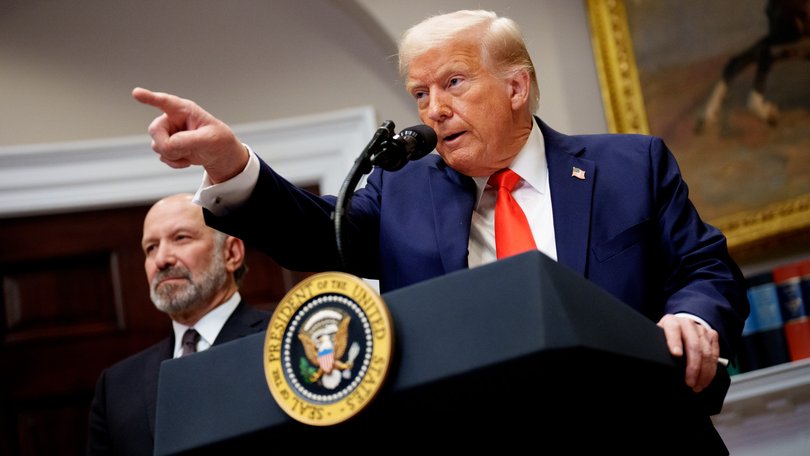Donald Trump’s adminstration take 10 per cent stake in Intel, in bid to expand control over private sector
The US government has taken a 10 per cent stake in embattled chipmaker Intel, in the Trump administration’s latest effort to exert control over corporate America.

Commerce Secretary Howard Lutnick has announced that the US government has taken a 10 per cent stake in embattled chipmaker Intel, the Trump administration’s latest effort to exert control over corporate America.
Intel, the only American company capable of making advanced chips on US soil, said in a press release that the government made an $8.9 billion investment in Intel common stock, purchasing 433.3 million shares at a price of $20.47 per share, giving it a 10 per cent stake in the company.
Intel noted that the price the government paid was a discount to the current market price.
Sign up to The Nightly's newsletters.
Get the first look at the digital newspaper, curated daily stories and breaking headlines delivered to your inbox.
By continuing you agree to our Terms and Privacy Policy.Of the total, $5.7 billion of the government funds will come from grants under the CHIPS Act that had been awarded but not paid, and $3.2 billion will come from separate government awards under a program to make secure chips.
“The United States paid nothing for these Shares, and the Shares are now valued at approximately $11 Billion Dollars,” President Trump wrote in a post on Truth Social.
“This is a great Deal for America and, also, a great Deal for INTEL.”
The government will also have a warrant to buy an additional 5 per cent of Intel shares if the company is no longer majority owner of its foundry business.
Intel said that the US government won’t have a board seat or other governance rights.
“As the only semiconductor company that does leading-edge logic R&D and manufacturing in the U.S., Intel is deeply committed to ensuring the world’s most advanced technologies are American made,” Intel CEO Lip-Bu Tan said in the press release.
“A great deal for them.”
Earlier on Friday, President Donald Trump said the government should get about 10 per cent of the company, which has a market cap of just over $100 billion.
“They’ve agreed to do it and I think it’s a great deal for them,” Trump told reporters Friday at the White House
White House officials previously told CNBC that Trump and Tan will meet on Friday afternoon. Lutnick’s post included a photo with Tan.
The marks the latest example of a distinct shift in U.S. industrial policy, with the government taking an active role in the private sector. Lutnick told CNBC this week that the U.S. government was seeking an equity stake in Intel in exchange for CHIPS Act funds.
“We should get an equity stake for our money,” Lutnick said on CNBC’s “Squawk on the Street.” “So we’ll deliver the money, which was already committed under the Biden administration. We’ll get equity in return for it.”
Earlier this week, Intel announced another major backer, when SoftBank said it would make a $2 billion investment in the chipmaker, equal to about 2% of the company.
Intel has been spending billions of dollars to build a series of chip factories in Ohio, an area the company previously called the “Silicon Heartland,” where Intel would be able to produce the most advanced chips, including for AI.
But in July, Tan said in a memo to employees that there would be “no more blank checks,” and that it was slowing down the construction of its Ohio factory complex, depending on market conditions. Intel’s Ohio factory is now scheduled to start operations in 2030.
Intel said last fall that it had finalized a nearly $8 billion grant under the CHIPS and Science Act to fund its factory-building plans. The CHIPS Act was passed in 2022, under the Biden administration.
